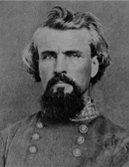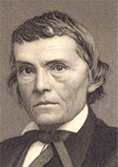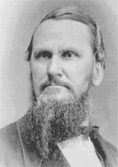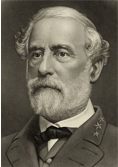Confederate Truths: Documents of the Confederate & Neo-Confederate Tradition from 1787 to the Present.








There Will Always Be a South, Sept., Oct. 1957
From the "There Will Always Be a South," by William A. Lester, United Daughters of the Confederacy Magazine, 1957, September pages 20, 21,24,32,45, 46; continued October, pages 46, 47. Errors in the original were only corrected where it was felt necessary for clarity and it was fairly clear what the error was.
There Will Always Be A South
By WILLIAM A. LESTER
(Address delivered before the William Lester Chapter and the Prosperity Chapter on 50th anniversary, by the grandson of General Lester for whom chapter was named.)
In the past fifty years, great strides have been made in the industrial development of the Nation. In the development we have maintained the social and political institutions and customs of the South.
This has been accomplished to a large extent by our southern women. The people of the South will always be indebted to you for this great contribution to our civilization, as our present and future happiness depends upon our maintaining these institutions and customs.
We are especially grateful to the United Daughters of the Confederacy for preserving the history of the War Between the States. Through you a fallen cause has been glorified. The world would have never known how nobly our forefathers fought and died if you had not kept their memory in tender reverence.
I feel fortunate in being a descendant of a Confederate Officer of the 13th South Carolina Volunteers. We all have a legacy that should be deeply felt, deeply valued, and deeply expressed. The rights we inherited must be defended, protected and transmitted unshorn to our children and to their children. "There will always be a South." The kind of
South, though, depends upon you and me.
WHAT IS THE SOUTH
When I refer to the South I do not mean a play on words. It came into existence during the Missouri Compromise debates in the United States Senate. The rising storm of jealousy and hate preceding the War Between the States made us a nation on February 4, 1861, when delegates from six of the lower South met in a convention at Montgomery, Alabama, and formed the Confederate States.
Our forefathers lived under this government for four years. Many of them gave their lives for it. All gave of their wealth to support and maintain it. They were compelled to yield to overwhelming numbers and resources in 1865.
During the 10 years that followed Appomattox an embittered North attempted to conquer and subjugate us. In this they failed as our forefathers were able to redeem each of the states from carpetbag rule by the same courage and bravery which they had shown on the battlefield.
The climax to this most remarkable and spectacular episode took place in the capitol of this state. Even though General Hampton and his Red Shirts saved South Carolina on that memorable occasion, this state with the other southern states in the Confederacy has been treated as Colonial States since then.
Many writers have attempted to describe the South and its people.
In "The Swallow Barn," Kennedy pictured the popular conception of the South as one great plantation, "open as an inn and as rich as a castle". This tradition reached its full flower in the 1850's under South Carolina's Gilmore Simms. The romantic conception of the South survived the War Between the States.
The abolitionist were however busy at the same time in releasing a flood of literature against the South.
None of the writers, though, from Nelson to Caldwell have given a true picture of the South. Prof. Norman Forester described the South in the University of North Carolina Press as "a land of varied forest and varied contour from mountain to sea, a land of exceptional natural beauty, inhabited by a people who impresses one at once with their different voices and different accents."
We are a land also inhabited by two races living separately. We are the only states of the Union that are a part of it by force of its armies. Further distinctions could be made but our concern today is in maintaining the South with its customs and institutions, with its other virtues and ways of life.
STRUGGLE FOR SURVIVAL
Many changes have come to the South and to the Nation during the past fifty years. During this period we have had three calamitous wars with revolutionary consequences, a technological transformation, migration of peoples, the growth of great cities, important cultural and educational developments.
We have shared in all of these changes, but have at the same time maintained our southern institutions, customs and way of life. This has brought about a continued relentless effort from the rest of the world to force us to modify these peculiar customs and institutions.
In view of the recent school and transportation decisions of the United States Supreme Court and the threat of discriminatory and punitive legislation by Congress, we are faced with a crisis in the South. In fact we are facing a great test in a struggle for survival of the South.
The patience and courage, and if required, the sacrifices made by our forefathers in the Reconstruction Period will be needed to fathom the deep cleavage in order to prevent an impending disaster.
Some of our people have an idea that a change in our southern institutions and customs are inevitable. I am sure this idea does not exist in this chapter or in any other chapter of the United Daughters of the Confederacy.
Our southern institutions and customs are a part of the Union. It began before the organization of the Union, and grew to fruition under the Federal Government. It is authentic American, and as such is entitled to the protection of the Federal Government. This protection can be obtained under the Federal Constitution.
MINORITY RIGHTS
In the emotional excitement of the Supreme Court's decision on the school question, we have overlooked that the very essence of the Federal system was the protection of minority rights. Under the provision in our Constitution, legislation against our southern institutions and customs can be prevented from passing Congress. This has been successfully done on several occasions in the defeat of so-called civil rights legislation, anti lynch laws, and abolishment of the poll tax.
Our southern Congressional leaders are aware of this right. They have issued the Southern Manifesto. Most of the states of the South have passed Interposition Resolutions. Both are based upon principles of government expounded by John C. Calhoun of this state.
In my state, as well as in the other southern states, we feel that you have another Calhoun in the Junior Senator from your state, Senator Thurmond. We are looking to him to continue to fight for the right of the South as a minority under the principle outlined by Calhoun.
We feel he belongs to us as well as you. Our success in maintaining our institutions and southern customs from the beginning of our government should convince everyone a change is not inevitable.
A private school system can be superior to our present public system. Provision can be made under a private school system for the education of both white and colored in adequately supported separate schools. In fact the South can make a great contribution to the world by bringing government back to the local level as intended by our forefathers.
We must not overlook our right under the Constitution. As a part of the Union, we can form as a minority, a barrier against a change in our southern customs or institutions under our Federal Government. Ours is a representative government—a Constitutional Republic.
Our concept of government provides for protection of the smallest possible minority, one person, against the impairment of his rights by the greatest possible majority, all other persons combined. It provides for the protection of every individual from the excesses of all other individuals or groups and, more important from the excesses of his own government.
HELP FROM OTHER SECTIONS
Tradition is a binding force. To analyze it seems as first thought a waste of time. Yet when we do stop to analyze it, some startling ideas appear. Tradition springs from the true heart of colonial America.
It has been overwhelmed in many sections of the country by influx of European habits, thoughts, and customs, which have worked insidiously to break down Americanism.
The early colonists, who sailed for the "Virginia Plantations", found that these lands stretched from the shores of the Carolinas northward to include the southern coast of Connecticut. Many a family was divided in its landings; one brother stopping in Connecticut, which he viewed as a fair land, and another continuing the long journey to Virginia itself.
The significant traditions dear to all of New England has not been swallowed by the flowing tide of immigration. These traditions are very similar to our own in many ways. Consider for instance two towns destroyed by fire at the same period of colonial history, and therefore rebuilt almost simultaneously.
The architecture of the two, one in South Carolina, and one in Maine, is almost indistinguishable. The porticoes are there, the columns; and the widow's walk appears on the roofs of many southern houses just as it does on those along the New England Coast. Pride of ancestry exist in New England as in the South, despite the battering assaults of newcomers.
This analogy might be drawn into the fine detail, and we might point to the settlement of the West by many of our people, but the suggestion is enough for our purpose. Traditional Americans think with a freedom unfettered by European political influences. But the teeming populations of great industrial cities have been overwhelmed by crosscurrents of foreign customs and beliefs, fears, and protests which remain for centuries—old influences in other lands.
Thus we have seen divisions of political parties caused by dissensions based on foreign prejudices. Fifty years ago we saw a Socialist Party rise and one of its first planks was the abolition of the United States Senate.
The only reason for this plank was the European origin of the party. The upper house of most of the European parliaments was hereditary. So, without rhyme or reason, the socialist listed our elected Senate for oblivion!
In recent years we have seen a departure from tradition by both of our major parties. There has been a trend toward centralized government that would have seemed impossible even twenty-five years age. This has happened because of continued compromise between the traditional people of America on the one hand, and the various special interest pressure groups, each with a different ideology, on the other hand.
But the combined strength of the traditional American vote has never been tested for a very unfortunate reason. The traditional votes of the South remain within the Democratic Party: those of the North, within the Republican.
So like-thinking Americans are manipulated so that their votes oppose each other. The managers of both parties, certain of the "traditional votes," barter away our rights in each election in order to gain the support of borderline groups.
It is time we did something about it, besides fuming and blowing off steam. It would be quite impractical to try and transfer the traditional loyalties of all sections to a combined strength within either of the old-line organizations. Yet millions of traditional Americans outside the South feel keenly that a combined showing of strength is necessary today.
What, if anything, are we going to do about it? Is it possible that within the broad scope of the word tradition there lies a path along which we might find common ground with those vast islands of tradition which still exist in the North and West?
Can't we unite with the vast unnamed multitude who feel as we across the whole length and breadth of the Nation, yet who have no present outlet for the expression of their actual desires?
I am happy that this question is being considered frankly and honestly by the leaders of your state like former Governor James F. Byrnes, S. L. Latimer, Jr., of the Columbia State, Tom Waring of the News and Courier, and others, with John Temple Graves of Alabama.
They are largely responsible for uniting the forty million people of the South into action as a group of states. We must have their continued leadership.
THE DEMOCRATIC PARTY
If assistance cannot be obtained from other sections, an organized militant minority group must be formed, as our problem is largely political. At the present the best course appears to be to form a militant South group in the Democratic Party.
We cannot join with the Republican Party, as it has never shown any interest in or sympathy for the South. Our struggle for survival is against the Republican Party and a Republican President today.
There is one lesson that has been learned during the past fifty years, that we must not forget, namely that we cannot have a two party system in the South. Such a system will open the way to the colored minority to control our state and local government, as they did in Reconstruction Days.
Under a two party system in the South, our people will be divided into two groups, each seeking power and privileges for their own end. In such a situation the colored minority could and would determine who won.
In this way they would control the local and state government in the south. In such event, the separate school system, and our other southern customs and institutions would fall.
Our state and local candidates must continue to be elected in primaries. In national elections, we must vote as a solid South in either the Democratic Party or in a new party. Our vote must not be divided as was the case in the recent election.
[Continued October U.D.C. Magazine]
Various organizations have been formed in all of the southern states to meet the crisis confronting us, but no organization has been created to represent the entire South. In the struggle that is ahead no individual southern state can succeed alone.
The essential sovereignty of our states has been destroyed. Our interest once represented by states must now be protected as a section. We have common needs, common hopes, common fears, common dangers.
In the future we must act as a section and speak with our votes as a solid South in either the Democratic Party or under some other name.
DEFEND SOUTH'S CUSTOMS
Our southern traditions and customs are helpful to the colored people. In the coming struggle we must be prepared to tell the world of the advantages of our civilization and be unafraid to defend it. The world must understand, as well as the South, that our institutions and customs follow God's design for mankind.
He made all of us after His image, but each one different from every other one. Even no two humans ever born have exactly the same fingerprints. Differences in individuals extend to their physical, mental, and moral characteristics.
If we have faith in God, we must realize that He had a purpose in designing us so that no person is like any other person. Each person is a distinct individual who should be free to find his place in the scheme of things as determined by his own God-given abilities and as a result of his own freedom of choice.
Variation among human beings has allowed one person to procure more than another, with resulting differences in material possessions. Any effort to equalize the social and economic status of all individuals by the coercive force of government is a contradiction of Nature's laws.
No one in the South is opposed to any individual having the equal right to the development of their personality, so far as may be compatable with the common good. This is proven by the opportunities we have given the colored people for an education and for economic development.
Our two races can be compared to the keyboard of a piano with its white and black keys. You can play a tune of sorts on the white keys and you can play a tune of sorts on the black keys, but for harmony you must use both black and white.
Our success, however, depends upon the people of the South. President (U.S.) Grant in withdrawing support from Governor Chamberlain said in an interview, "The entire army of the United States would be inadequate to enforce the authority of Governor Chamberlain." The people have resolved not to resort to violence, but have adoped a mode of procedure much more formidable and effective than any armed resistance.
There is no need for armed resistance today, but all of our people must be united and willing to make whatever sacrifice necessary to maintain our southern customs.
Franklin Roosevelt told the nation in 1936, "There is a mysterious cycle in human affairs. To some generations much is given. Of other generations much is expected. Our heritage is of a goodly land with a birthright of freedom".
We must keep, hold, cherish, and preserve our traditions for generations unborn.
Our forefathers were dedicated to the principles I have outlined. They held fast to them through the years. There was a war of brother against brother with the destruction of our social and economic system which was followed by the Reconstruction with its frustration and agony.
Our task is to continue to preserve our southern institutions and customs. In doing this we must not overlook our duty to the Republic to help defend it. We must improve our state and local and national government and continue the social and economic progress of the past fifty years.
Secession is no longer necessary. Our efforts should be made as Americans. In fact we are the most American Americans. Herein lies our strength. We will win. "There will always be a South."